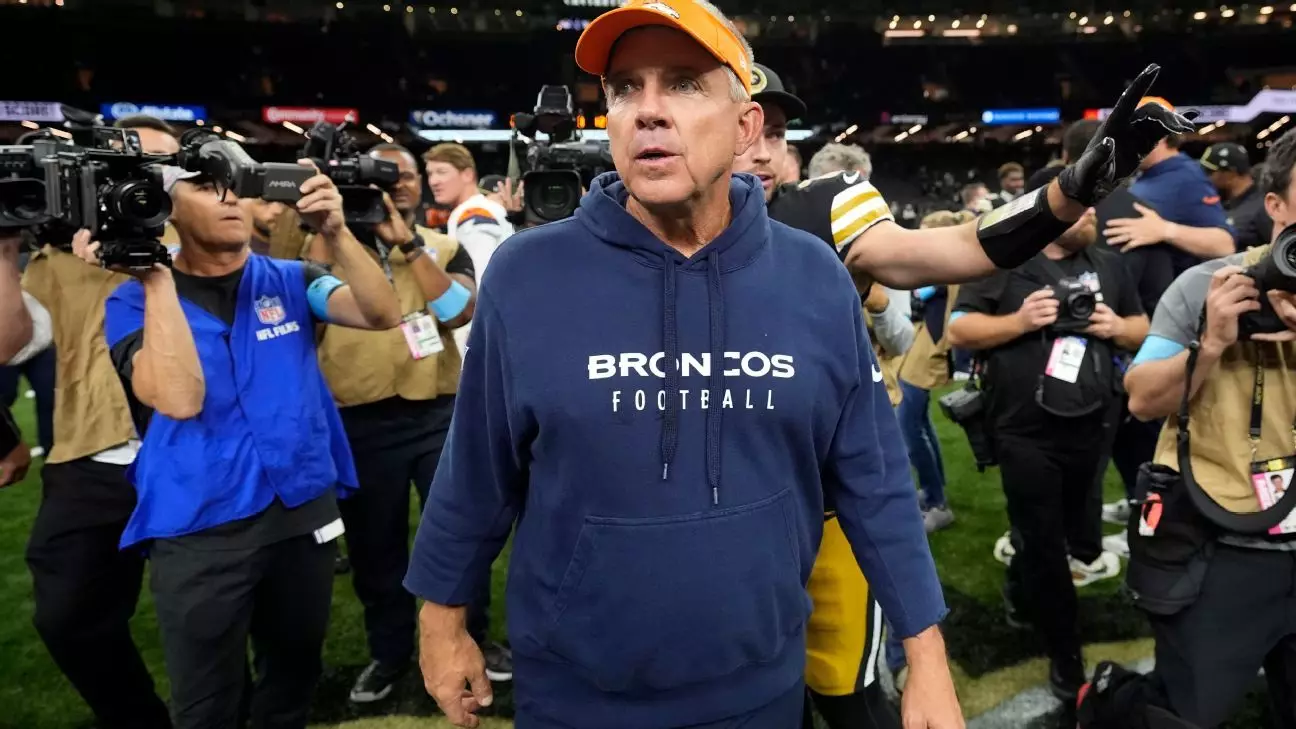In the world of professional sports, few narratives are as compelling as the return of a beloved figure to their previous haunt. The recent Thursday night football game saw Sean Payton, head coach of the Denver Broncos, making a poignant return to the New Orleans Superdome, a venue infused with personal history. After serving as the head coach of the New Orleans Saints for a significant sixteen-year tenure, Payton’s emotions were palpable. His anticipation encapsulated a blend of nostalgia, gratitude, and the added complexity of competing against his former team.
Payton’s deliberate choice to arrive six hours before the game serves as a testament to the emotional weight of the occasion. “Just had plenty of time to grab some coffee,” Payton reminisced, highlighting the significance of that early moment—a moment of solitude before the hustle and bustle of game day. It was a unique approach to reconcile competitive spirit and personal remembrance, underscoring the complexity of returning to a familiar environment under adversarial circumstances.
The Broncos’ dominant 33-10 victory over the Saints was not just a validation of Payton’s decision; it was a masterclass in defensive football. Throughout the game, the Broncos showcased an elite level of play, amassing six sacks and a defensive touchdown, effectively dismantling the Saints’ offensive efforts. Their ability to restrict the Saints to a mere 271 total yards demonstrated formidable strategic execution, especially given that a majority of these yards were garnered in a fourth quarter where the Broncos had introduced backup players.
This performance by the Broncos encapsulates what Payton has sought to instill in his team—discipline, as well as a commitment to excellence, particularly in a challenging week that featured a truncated practice schedule. “It’s just easy to complain on a short week,” he remarked post-game, further emphasizing the necessity for focused performance, regardless of logistical challenges. The Broncos’ ability to rush for an impressive 225 yards, led by standout performances from running back Javonte Williams and quarterback Bo Nix, complemented their defensive tenacity and showcased a balanced offensive strategy.
The emotional dynamics’s surrounding Payton were heightened by the presence of Drew Brees—the very quarterback who had been instrumental to Payton’s coaching success over the years. Brees, honored at halftime, symbolized not only Payton’s past but also the shared legacy of the Saints under his leadership. The sellout crowd’s thunderous welcome for Brees emphasized the lasting impact he has had on the franchise and the city, fostering a connection that transcends the game itself.
As Payton interacted with family and friends before the kickoff, the interplay between personal and professional realms became evident. Many in the crowd were not only witnesses to a game but also to the collective memories held by players and fans alike. The emotional nature of the evening was further accentuated as Broncos’ running back Tyler Badie shared poignant nostalgia about his connection to the Saints, encapsulating the weight of history and personal journey intertwined in this encounter.
Post-game, the emotional resonance of the night crystallized as Payton received the game ball—a symbolic gesture acknowledging the significance of his leadership and personal history with the organization. “It meant a lot,” he expressed, a remark laden with reflections on his tenure, relationships, and the deep-seated emotions tied to the city of New Orleans.
While it is easy for a coach to be swept up in the competitive emotions of such a game, Payton’s ability to navigate through these layers of sentiment—grief, nostalgia, and pride—mirrors the journey of many coaches who find their legacies intertwined with the cities they leave behind. The juxtaposition of winning against his former team while upholding respect for his past speaks volumes about maturity in leadership.
Sean Payton’s return to New Orleans as the Broncos’ head coach was rich with narrative—his deep ties to the city, the emotional tribute to Drew Brees, and the strategic triumph of his current team. In a league often dominated by transient relationships, this evening illuminated how coaching careers are not just defined by victories and losses but by the powerful connections forged with players, communities, and memories. It serves as a reminder that in the world of sports, the human experience is just as important as the game itself.

Leave a Reply